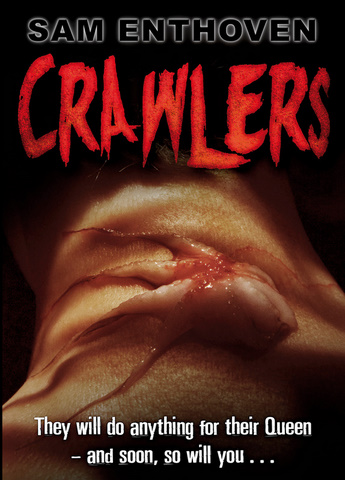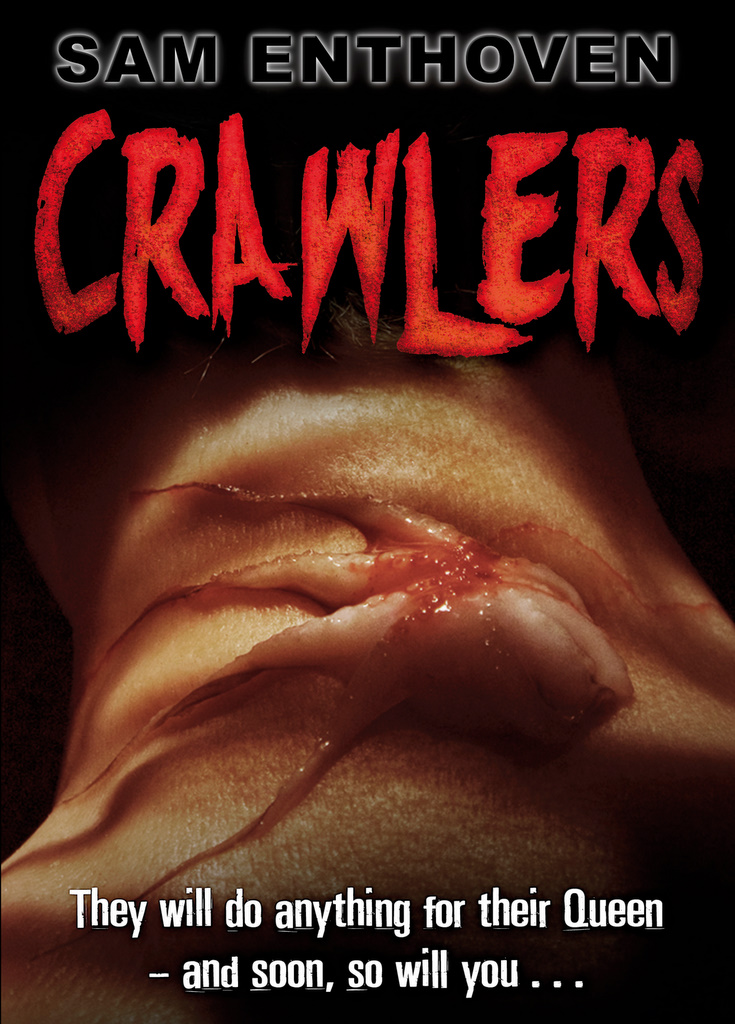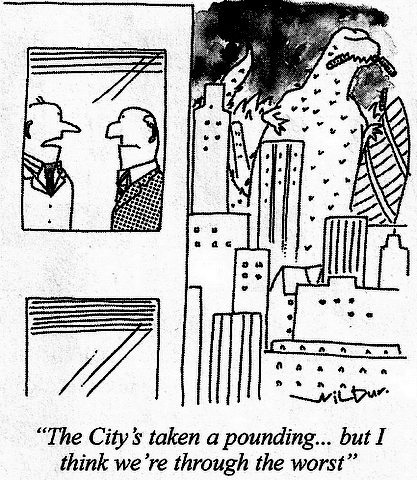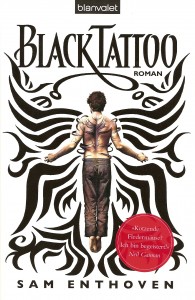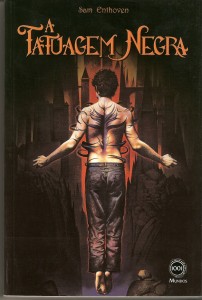Just taking a quick break from PHASE THREE (third draft’s been a battle, but I’m getting there!) to share two things.
First up, look what came in the post yesterday…!
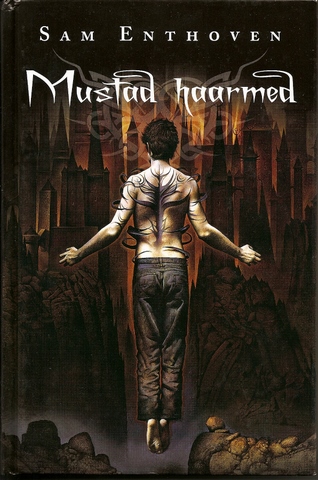
It’s the ESTONIAN edition of Black Tat! And it’s a particularly gorgeous item, too: a hardback with full colour endpapers. The idea of my stuff being translated always puts a grin on my face. HEE HEE HEE HEE!
Now: after a proper ‘ice cream moment’ like that, it seems like a good minute to give you a taste of the rougher parts of being an author, to go with the smooth. A couple of months back – he’s just given me permission to quote him – Xiaoyao, a young writer from Australia, asked me the following:
“There is a recent dilemma about my story. I just woke up one day, took a look at the word document and thought: “What a load of rubbish.” It just looked so bad, and I saw all my years of writing with disgust. I think that it was because the original idea started when I was really young, and the plot elements seem so childish now. It could also be because I haven’t done anything with the story for a term due to homework. The main thing is, I just don’t like it anymore. I think that it is too shallow. I’m wondering what I should do. Should I just scrap it and start a new book with a deeper meaning, or should I continue until it’s finished, /then /start a new book? I’m not very sure; could you give me some advice? Thnx,
Xiaoyao”
If any writer tells you they’ve never felt this way about their work, they’re lying. Here’s what I wrote back:
Hi Xiaoyao,
I’m sorry to hear about your current project, and your feelings about it. I’m not going to tell you whether to give up on it and start again or not. I think the only person who can decide that is you. I can make a couple of observations, though.
First: books are long. They’re big projects and they take a long time, as you know. But I would also say that the attention they demand is constant. If – during a draft, especially the first – you take a break from them for more than (I’d say) about two or three weeks, then you run a real risk of losing momentum in just the way you describe. [I know that kind of constant commitment is very difficult when you’re at school, or doing a full-time job. More on this later.]
Books, too, are an enormous leap of faith. In any book, there will always be points where you have doubts. You will wonder why you’re doing it. You will think that what you’re doing is rubbish. That just goes with the territory, I’m afraid. The trick is to find ways to get past it.
One trick that works is planning: if you know that your book is full of things that you’re excited about, that you’re going to enjoy writing, then that helps keep you going.
Another, as I say, is momentum: keep writing, keep coming back to it, keep moving forward.
Another important one, is accepting that whatever you write, it will not come out perfect first time. This, I think, is a crucial one.
Until you complete a first draft – until you’ve got the whole thing down and have written ‘The End’ – your focus should simply be on making forward progress. You must accept that some – even most – of what you will write is probably not that great, but IT DOESN’T MATTER, because once you’ve got to the end you can go back and fix it!
This, for me, means that when I’m writing the first draft of a story, I don’t allow myself to look back. If I look back, I will see only the lousy bits. I will start to lose hope. And that will only make the job of finishing the first draft even harder.
This is especially true for the first time you write a book. Because you’re not sure if you can do it – right? Each time you look back, there’s a weight of expectation: you’re hoping that something in what you see in your work is going to “prove” that you’re a proper writer. Human nature being what it is, all you’re going to see (as I say) are the lousy bits – things that make it seem like you should give up because you’re never going to get there. Ironically, you’re probably underestimating the most important part of your work and what it shows: YOU GOT THIS FAR. That is impressive. That shows you’re serious.
I believe that what makes a writer isn’t, in fact, things like a love of stories, a gift with words, a wild imagination – though those certainly help. I think what makes a real writer is the ability to keep going – the ability to carry on making progress, even though the destination is uncertain and sometimes you can’t remember what you’re doing it for.
Here’s something I love by Miyamoto Musashi, from The Book of Five Rings (translated by Stephen Kaufman). Musashi was the most famous swordsman Japan has ever known. He’s talking here about teaching himself swordfighting, but it’s just as true for writing:
“This is a very difficult road to travel and not many are made for it. It is frustrating, confusing, very lonely, certainly frightening, and it will sometimes make you think you do not have much sanity left to deal with the everyday surroundings of your world. Also, there is no guarantee that you will attain [your goal]. It must all come from inside you, without any preconceived notions on your part.”
Xiaoyao, you’re in full time education! Finding the time and the energy to write when you’re at school, or you’ve got another job, is very hard! I have enormous respect for the fact that you’re even attempting to write a book at this point in your life. So the first thing to do is to cut yourself some slack. What you’ve done already is extremely impressive. So don’t feel too down on yourself.
As to what to do about this particular story… as I say, that’s up to you. Can you remember why you wanted to write it? If the doubts about where the story is going are too strong, then you may be better off abandoning this one. There’s no shame in that. The first time I tried to write a book I had to give up after thirty thousand words. I felt crazy. I got so scared that this first failure meant I wasn’t a proper writer that I couldn’t sleep! But once I’d recovered, once I’d picked myself up, the next time I tried to write a book I was armed with the lessons I learned from that first experiment. I had a better idea of what to expect.
If you /do/ decide to carry on with this book, then the best of luck to you. But I would advise you also to remember my two other points above. Don’t leave the book for longer than two weeks. And don’t look back until you’ve reached the end.
There’s a third alternative. You could also accept that right now your schoolwork is keeping you too busy for you to attempt to write a book. That’s fine, too: concentrate on building up your skills with short stories for a while, perhaps? Then once there’s space in your life for you to commit yourself to the kind of long-term, regular schedule that a bigger project involves, then that’s when you next take a shot at this.
I hope the above is helpful, Xiaoyao. Let me know what you decide.
…A week ago, Xiaoyao wrote back to me to say he’s carrying on.
Excuse me, but if I’m going to meet this deadline I should follow his inspiring example. 😀
--------------------------
Comments? Suggestions? Questions? Me and THE WEBSPHINX would love to hear from you! Drop us a line at the
Tim, Defender of the Earth Guestbook for current or
Tim stuff, or
The Black Tattoo Guestbook for
Black Tat stuff. First (or demon-!) names only, please. 😉
